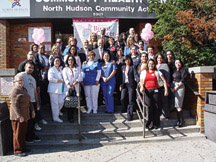It was a clear, sunny Monday outside of the West New York branch of the North Hudson Community Action Committee (NHCAC) as the staff – some of them cancer survivors themselves, and all of them clad in various pink accoutrements and surrounded by a sea of pink balloons – celebrated Breast Cancer Awareness Month.
The weather matched the mood of all involved on Oct. 17, considering the $5,000 grant they’d recently received from the North Jersey affiliate of the Susan G. Komen Foundation, and that the staff’s breast cancer research fundraising efforts were well on their way toward topping the $14,000 they’d raised in 2010.
NHCAC employees have come together every October in an effort to raise awareness in the community by providing a month’s worth of breast cancer education classes, free breast cancer detection and diagnosis appointments, celebratory events honoring survivors, bake sales, and more.
“Preventative medicine is so important.” –Chris Irizarry
____________
Reason to celebrate
NHCAC President and Chief Executive Officer Chris Irizarry and Family Planning Coordinator Maria Aguilera addressed an enthusiastic audience, emphasizing the importance of early detection, education, and community outreach.
Aguilera congratulated the staff on their selfless efforts over the past month. She served as the team leader for the 5K walk in Jersey City and was very proud of the turnout.
“It’s better for us to give than to be on the receiving end,” she stated, “because when we give, we also receive.”
Irizarry explained the NHCAC’s extensive outreach during Breast Cancer Awareness Month. “We do this…to raise awareness so that people in the community understand the importance of being tested and going to the doctor,” he said. “Preventative medicine is so important.”
He said that in 2010, one in eight women was diagnosed with invasive breast cancer, and in the same year, 40,000 women in the United States died from it. “It’s our mothers, it’s our sisters, it’s our daughters that suffer from this disease,” he reminded the audience, which is why involvement from the entire community is so important.
The cause hits close to home
As NHCAC Medical Assistant Maria DeLeon stood with fellow staff members in the audience that day, she couldn’t have agreed more with Irizarry’s call for early diagnosis.
DeLeon has worked at the center for 15 years. That Monday marked the 9th anniversary of her diagnosis with breast cancer. Fortunately, after she received a mammogram at the center, doctors were able to detect the disease early enough and she is currently in remission. “Thanks to that screening mammogram, I’m here today talking to you,” she said.
DeLeon gives mammograms herself every day at her job, and recommends that women check themselves once a month. She said that many people are afraid to get checked because they fear the worst, but it could be much worse for them if they don’t.
How demographics play a role in the importance of community awareness
In 1994, NHCAC founder Michael Leggiero asked Dr. Jorge Verea to collaborate with him to form the group’s very first health center. Verea had always been involved in the community (he runs a large private practice in West New York today), so he jumped at the chance to use his medical talents to help those around him.
“It became a passion,” he said that Monday amongst his NHCAC peers. “I love my private practice, but this is my baby.”
Verea said the moment Leggiero asked him to join in the task of creating federally qualified health centers that specifically addressed the North Jersey minority communities, his life took on a greater purpose.
As NHCAC’s chief medical officer of internal medicine, Verea understands that the individuals he serves face many life challenges such as poverty and lack of health insurance, as well as lack of awareness about chronic conditions. Because many members of the community are undocumented immigrants, he says, they also have limited access to proper health care.
All of these factors combined, he said, create a serious health crisis specific to the area’s Latino demographic, particularly with breast cancer. Verea believes the reasoning behind this is that “Latina women don’t have access [to preventative care] on a timely basis, so there’s delayed treatment,” he said. “So often when they do finally come, the cancer is usually at an advanced stage.”
Which is where the NHCAC comes in. The 10 centers provide hundreds of mammograms a day to anyone who walks through the door, even to those without health insurance. Verea and his team reach out to churches, attend community events and send a mobile unit out around the area to provide free screenings and to raise awareness on the importance of early diagnosis.
Verea is hopeful that he and the staff of the NHCAC will continue to improve the health and the lives of those in the surrounding communities.
“We have such a great team in place,” he said. “No one can ever do this thing so well.”
For more information on the NHCAC or to schedule an appointment, visit their website at www.nchac.org, or call (201) 210-0100.
Gennarose Pope may be reached at gpope@hudsonreporter.com/a>
